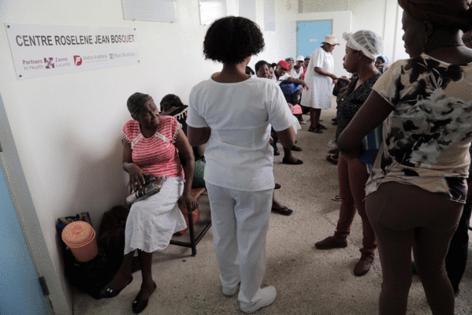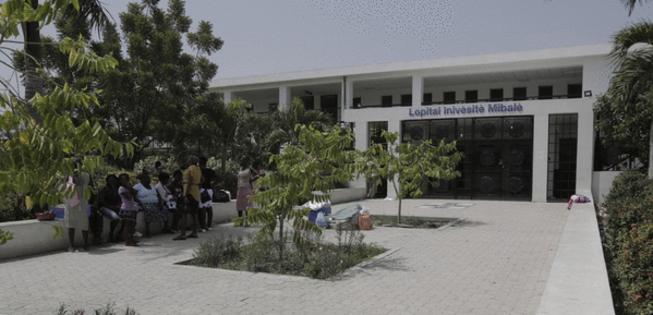Gang attacks force closure of Haiti's 'beacon of hope' hospital as health crisis grows
Published in News & Features
In a crisis-wracked nation where hospitals were hurting even before U.S. aid freezes earlier this year and gangs torched or gutted many medical facilities, the University Hospital of Mirebalais was among the last still standing.
With solar-power, 300-plus beds and a network of U.S. doctors and experts in global health, the 205,000-square foot state-of-the-art facility provided free cancer care to women and children. It allowed renal patients in northern and central Haiti to access free dialysis treatments without risking their lives passing through gang controlled roads to Port-au-Prince. And it had boasting rights as the only place in the entire Caribbean where conjoined twins were ever separated.
“It was our beacon of hope,” said Dr. Henri Ford, the Haiti-born dean of the University of Miami’s Miller School of Medicine, who in 2015 led a team of more than two dozen health professionals in separating the 6-months old girls, joined at the abdomen, inside the Mirebalais hospital’s operating room. “It really stood as a symbol of the Haitian potential; what we could realize as a nation if we came together and put our minds to it.”
With billions of dollars promised, and never delivered, after the devastating 2010 earthquake, l‘Hôpital Universitaire de Mirebalais, as it is known in French, was also a promise met. The $24 million privately built, public facility in Haiti’s Central Plateau opened its doors in April of 2013 and was the vision of the late Dr. Paul Farmer. A world-renowned global health champion and co-founder of Boston-based Partners In Health, Farmer devoted his career to bringing healthcare to Haiti’s rural poor.
Weeks after evacuating the facility, the hospital’s executive management has now informed staff in an internal note that the doors will remain closed “until further notice.” The team cited “the worrying security situation prevailing in the city.”
It’s another Haitian city fallen into the hands of armed gangs and another health facility forced to shutter its doors, further reducing the dwindling healthcare options for millions of Haitians.
“There is no way to justify the needless destruction of these medical facilities by the gangs,” said Dr. Ted Higgins, a retired Kansas city vascular surgeon who built and runs the Higgins Brothers Surgicenter for Hope, east of Port-au-Prince in the town of Fond-Parisien near the border with the Dominican Republic. “It is senseless and criminal but continues to occur as we watch from a distance.”
An American missionary, who helps with a medical clinic near the city of Mirebalais, described to Higgins on Wednesday the aftermath of the gangs’ attack in the city, 30 miles northeast of the capital and near another border crossing with the Dominican border.
“They removed the solar panels, broke into the church and clinic, and stole medications along with medical and dental equipment, including the new X-ray and sonogram machines,” the missionary said.
“Even sadder, we built homes for two families that were squatting on the property when we purchased it years ago, they burned their homes. The area is under their control,” she went on to say, adding that the facility is now a gang headquarters.
One church member who managed to escape to the nearby town of Cange, where Farmer first began his work in Haiti with a clinic before opening a network of medical centers, is now considering returning, the missionary added, because the woman believes it is only a matter of time before the armed groups attack Cange and she doesn’t want to be there for the initial violence.
“At least,” the woman has rationalized about her return to Mirebalais even while being overrun by gangs, “she will have a roof and food they give out from time to time.”
Gangs force out thousands in central Haiti
The attacks were launched by two gangs, 400 Mawozo and the Canaan gang, which also refers to itself as “Taliban.” Both are part of the powerful Viv Ansanm gang coalition, which now controls up to 90% of metropolitan Port-au-Prince and on Wednesday killed several members of Haiti’s security forces and of a self-defense brigade during gangs’ attempt to gain control of two new capital neighborhoods.
After storming Mirebalais on March 31 and attacking the police station, gangs released more than 500 prisoners from the local prison. They then targeted the rural town of Saut d’Eau, which lies at the crossroads of the Central Plateau where Mirebalais is located and the West region where Port-au-Prince is situated.
More than 51,400 Haitians have been internally displaced in the Central Plateau area, the United Nations International Organization for Migration said this week. At least 76 others have been killed, according to Haiti’s Office of Civil Protection.
“The crisis has disrupted public services and education,” Stéphane Dujarric, spokesman for U.N. Secretary General António Guterres told reporters in New York. “All schools in Mirebalais and Saut-d’Eau are closed, with more than 30 schools in neighboring communes being used as temporary shelters for displaced families.”
Power cuts, disruptions to communications networks, and the ongoing presence of armed groups were all hampering response efforts, he said. But despite the challenges, U.N. aid agencies and their partners were scaling up the response to support those affected by the brutal violence.
“Our humanitarian colleagues note that protection needs are surging. Women, children and people with disabilities require urgent support, and signs of post-traumatic stress have been reported, particularly in the area of Boucan Carré,” Dujarric said about the neighboring town where the majority have fled.
Dozens of hospitals, clinics shuttered
In less than four years, Haiti has seen the destruction and closure of dozens of hospitals and medical clinics as armed groups take over entire towns and set up encampments in places of worship, private homes and buildings that once saved lived.
In January, when the Trump administration announced cuts to foreign aid, Mirebalais was still functioning and opening its doors to HIV/AIDS patients forced to find a new treatment after cuts forced some agencies dependent on the United States Agency for International Development, to close their doors.
Now its beds are empty, all of its patients either sent home or transferred elsewhere including 10 hospitalized children, some of whom with Cerebral palsy and others abandoned, now being cared for by a partner organization.
“It’s the biggest tragedy of my lifetime to see this shut down and taken over by a bunch of thugs,” Ford said.
In a statement about the situation, Partners In Health noted that for the past decade, whenever someone has fallen sick or a disaster has struck Haiti, the University Hospital of Mirebalais “has proudly stood as a place where anyone, no matter their background or income, could get access to the free, high-quality health care that they deserve.”
“The tenacity of our colleagues throughout this incredibly challenging period has been a beacon of hope for the people of Haiti and served as the physical manifestation of our organization’s commitment to serving as an antidote to despair,” the statement said.
At the time of the statement, the hospital had not been attacked. As of now, staff is still trying to assess its state, unable to safely access its grounds or any area south of the Rivière de Fer à Cheval, which is part of the main tributary of the Artibonite River, due to the heavy presence of heavily armed gang members.
“PIH began in Haiti, and our core values of solidarity and accompaniment emerged from our work with Haitian communities,” Dr. Shelia Davis, CEO of Partners In Health, said. “No matter how daunting the challenges of this particular moment have seemed, our Haitian colleagues have never wavered or indulged in the luxury of pessimism, and I couldn’t be more proud to say that our organization will continue to stand with the people of Haiti today, tomorrow, and long into the future.”
Dr. Wesler Lambert, executive director of Zanmi Lasante as Partners In Health is known in Haiti, said clinical operations are continuing in other institutions in the network, where patients have been transferred, and staff reallocated.
Both Lambert and Davis spoke of resuming activities in Mirebalais as soon as it is safe to do so. But when, is anyone’s guest. Police have lost control of the city and the gunmen are now declaring themselves rulers of the region. They’ve seized control of at least one station, renamed it “Taliban FM,” and now use it to spread their propaganda amid mounting fears the region’s capital of Hinche, will soon be their next target.
The escalating gang violence has left Haiti’s health system on the brink of collapse, and Haitians with few options as they not only battle chronic illnesses but increase cases of sexual violence, hunger and malnutrition.
In Port-au-Prince, where gunshot victims are dying due to a lack of blood supply and oxygen, less than 40% of hospitals are fully functionally, according to the U.N. Elsewhere, the access to healthcare is even more scarce as communities find themselves unable to get lifesaving medicines and supplies, or even a doctor due to gangs’ control of roads.
Earlier this month, Haitians lost access to two facilities in metropolitan Port-au-Prince run by the French medical charity, Doctors Without Borders/Médecins Sans Frontières. Citing the spiraling violence and what it described as an “intentional” attack against its staff, the charity said it was closing an emergency center and a trauma hospital for three months. During that time, MSF says it plans to evaluate whether its staff can continue operating in such an environment after being targeted.
Dominican immigration crackdown
This week, Higgins and others were grappling with another fallout of the health crisis and gang violence. One of his physicians, Dr. Jolius Thelusme, a urologist surgeon, found himself jailed in the Dominican Republic while trying to cross back into Haiti from northern Haiti where he was seeing patients in Cap-Haïtien. Because of the gangs control of Saut d’Eau, and other cities leading to Fond-Parisien where Thelusme lives and works, he could only access eastern Haiti via the Dominican Republic.
But as he traveled through one immigration check point after another on a bus on Saturday, he was eventually arrested by Dominican immigration and placed in an iron box truck, despite presenting his passport and authorization to enter the country. He was taken to a detention center in Haina. After being confined to a crammed cell, Thelusme was eventually released on Tuesday but not before he was handcuffed and forced to have his photo taken before being handed over to an official of the Haitian embassy. Other Haitians, have not been as lucky.
On Wednesday, Dominican authorities said they had deported 135 people, including children and dozens of women whom had just given birth and others still pregnant, back to Haiti as part of a crackdown on undocumented Haitians. The deportations are part of series of 15 new controversial measures President Luis Abinader announced would begin taking effect on Monday.
Dominican police officers were deployed to over 30 hospitals and the government said 48 pregnant women, 39 new mothers and 48 minors were apprehended on the first day and taken to a detention center to be fingerprinted. They were later dropped off at the Elías Piña border crossing, which is in the same region as gang-controlled Mirebalais.
“Delivering healthcare in Haiti is nearly impossible with a lack of humanitarian corridors, particularly around the Port-au-Prince area, and difficult entry routes for medical supplies, medications, and equipment,” Higgins said. “Now with the gangs destroying medical centers and medical facilities, trashing medical equipment, and turning the facilities into headquarters, there will soon be no delivery of healthcare in Haiti if this pattern continues.”
“The Haitians who remain and provide care for their people are all heroes,” he added. “They know and are fearful of the gang warfare situation, but most healthcare providers stay with the hope that stability in Haiti somehow can be accomplished.”
©2025 Miami Herald. Visit at miamiherald.com. Distributed by Tribune Content Agency, LLC.










Comments